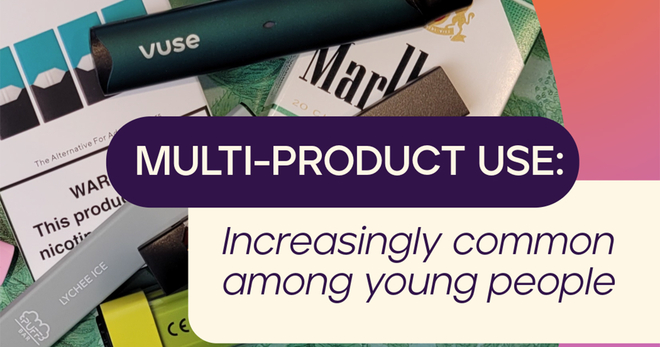Depression Stick! is fake but vaping’s contribution to the youth mental health crisis is real
In its latest youth e-cigarette education effort, “It’s Messing with Our Heads,” truth created a fake vaping company called Depression Stick! to expose nicotine’s role as a contributor to the worsening youth mental health crisis.
Nicotine use and mental health are linked in many ways, according to a body of peer-reviewed research that highlights how nicotine can worsen anxiety symptoms and amplify feelings of depression and is gathered in a Truth Initiative report. Through a TikTok takeover, pop up shops, influencer unboxings and a hidden-camera style advertisement following its VP of marketing as he tries to “sell depression,” Depression Stick! underscores the mental health impact of real nicotine vape products like JUUL, Vuse, blu, Logic and NJOY, the leading e-cigarette brands popular among youth. As many vape brands do, enticing young people to try and use tobacco products, Depression Stick! boasts fruity flavors like Citrus Sadness and Disappoint-mint, drawing attention to how the youth vaping epidemic and youth mental health crisis are colliding.
“It’s Messing with Our Heads” reveals important information about nicotine’s impact on mental wellbeing, the tobacco industry’s on-going attempts to distort public perception about the health effects of vaping products, the importance of quitting vaping and the urgent responsibility of the Food and Drug Administration (FDA) to fully regulate e-cigarette products to protect youth.
Research shows vaping is an obstacle to mental health
According to a recent study published by the Journal of the American Medical Association (JAMA), the odds that a current e-cigarette user will receive a depression diagnosis are double those of people who have never vaped. The odds are even higher among current e-cigarette users who vape more frequently, compared to never users.
Another study published by Preventive Medicine found that ninth graders who had never smoked or vaped before, but started to vape, reported more depressive symptoms a year later compared to ninth graders who had never smoked or vaped before and didn’t start.
The prevalence of depression and anxiety symptoms has doubled among youth during the COVID-19 pandemic, an additional JAMA study shows, and the National Youth Tobacco Survey reports that 1 in 5 high school students vape and nearly 40% of the vaping high school student body vape frequently. It’s evident that e-cigarettes pose a threat to the mental health of a generation.
What the tobacco industry isn’t telling young people
But the tobacco industry is telling the public a different message. From an early Camel cigarette ad that depicts a relaxed smoker with the text, “It’s a psychological fact, pleasure helps your disposition. For more pure pleasure – have a Camel,” to a COVID-19-themed description of the e-cigarette brand Puff Bar as a way to “stay sane” and “the perfect escape from back-to-back zoom calls, parental texts, and WFH stress,” the tobacco industry often depicts its products as stress relief. These marketing tactics compound a common misinterpretation of the effects of tobacco products as a stress reliever, a misconception that may be rooted in the cycle of nicotine withdrawal.
In Truth Initiative’s August 2021 survey, four in five young people who have used e-cigarettes (81%) did so as an attempt to lessen their stress, anxiety or depression. In the same survey, 56% of young people who frequently vape don’t know that e-cigarettes can increase their anxiety and irritability.
“It was time for the tobacco industry to be exposed as a contributor to the mental health crisis to help end youth vaping,” said Robin Koval, CEO and President of Truth Initiative. “In edgy truth fashion, Depression Stick! boldly highlights the marketing tactics Big Tobacco uses to lure young customers into life-long addiction and mess with their heads. The multi-platform campaign places the necessary spotlight on nicotine’s role in potentially heightening symptoms of depression and anxiety to give young people the facts they deserve to make informed decisions to live their best and healthiest lives.”
Quitting vaping benefits youth mental health in the long-term
Evidence shows quitting vaping can lead to positive mental health outcomes. This Is Quitting, the first-of-its-kind free and anonymous texting program from truth to help young people quit vaping, has become a resource for more than 370,000 young people seeking to break free from e-cigarette use. A randomized clinical trial found that young adults aged 18-24 who used This is Quitting had nearly 40% higher odds of quitting compared to a control group. According to Truth Initiative’s continuous tracking survey, 47% of young people who quit vaping feel more in control than when they were vaping, and 90% feel less stressed, anxious or depressed.
To access This Is Quitting and receive immediate help, young people can text “DITCHVAPE” to 88709. Parents of young people who vape can receive support at BecomeAnEx.org. Free mental health resources from partners of truth can also be found at thetruth.com/article/mental-health-resources.
By texting DITCHVAPE to 88709, you consent to recurring messages from Truth Initiative to help you quit vaping, and agree to the Terms & Conditions and Privacy Policy. Text STOP to opt-out. Text HELP for info. Msg & Data Rates May Apply.
To protect youth, FDA must regulate e-cigarette products
“It’s Messing with Our Heads” follows the FDA’s delay of a court-mandated decision on the premarket tobacco product applications (PMTAs) of JUUL and other top e-cigarette brands that, together, are 75% of the vaping market. This summer, e-cigarette sales across the country rose to record highs, according to the CDC Foundation. The FDA’s inaction allows these products to stay on the market and continue to entice youth.
Before the fall return of many students to campuses nationwide, 70% of young people (15- to 24-year-olds) predicted in an August 2021 survey by Truth Initiative that they would see as many or more of their peers vaping when they return to school than when they were last together. As “Colliding Crises: Youth Mental Health and Nicotine Use” – Truth Initiative’s most recent report – shows, the vaping epidemic and mental health crisis young people face are all too real.
More in emerging tobacco products
Want support quitting? Join EX Program
By clicking JOIN, you agree to the Terms, Text Message Terms and Privacy Policy.
Msg&Data rates may apply; msgs are automated.


